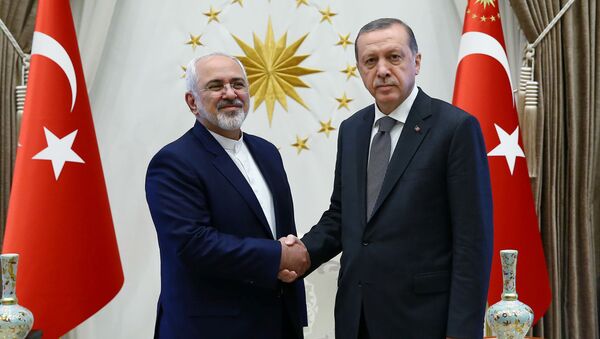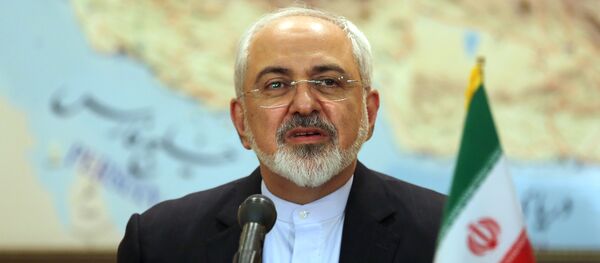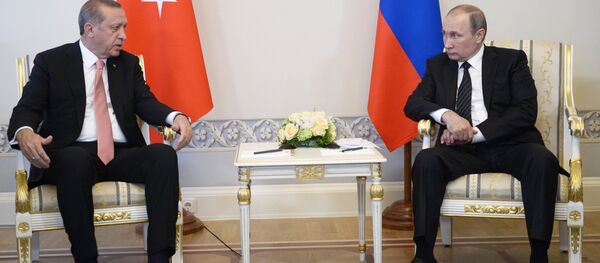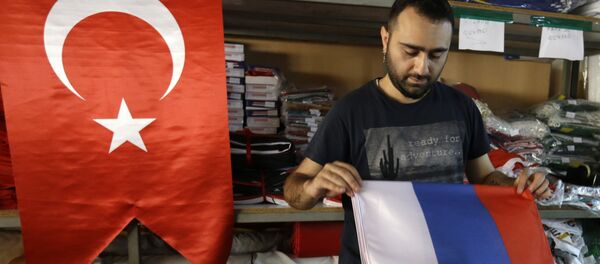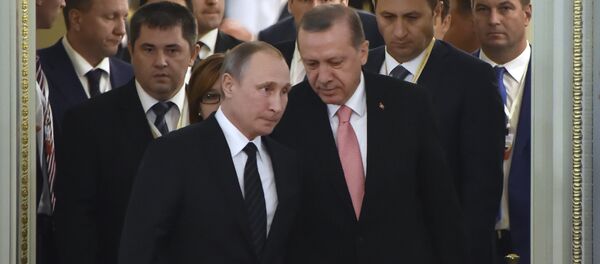In a visit to Ankara on Friday, the first since the failed Turkish coup attempt last month, Iranian Foreign Minister Mohammad Javad Zarif was reported to have offered to facilitate a joint meeting between the leaders of Iran, Russia and Turkey to discuss settling the Syrian crisis. In the course of his visit to the country, Zarif met with Turkish President Recep Tayyip Erdogan, Prime Minister Binali Yildrim and Foreign Minister Mevlut Cavusoglu.
Speaking at a joint press conference with Cavusoglu, the Iranian foreign minister also emphasized that the three countries were "key players in the region, and need to engage in dialogue and cooperation." Hinting at the existing disagreements over the situation in Syria, Zarif noted that "even if there are differences among regional countries, they can be ironed out via dialogue."
A day before his meeting with Zarif, Cavusoglu said that Turkey would be resuming its air campaign against Daesh (ISIL/ISIS), adding that Ankara was ready to discuss with Russia the possibility of a concerted effort against the terrorist group, indicating that the Turkish military has details on the location of Daesh bases. "This does not mean that Turkish aircraft and Russian aircraft will be flying together," he clarified.
In turn, Russian Deputy Foreign Minister Mikhail Bogdanov said that Russia welcomed Turkey's readiness to discuss joint actions against Daesh.
Commenting on Cavusoglu's statements, and on Zarif's proposal of a Russian-Iranian-Turkish partnership in the Middle East, Svobodnaya Pressa contributor Anton Mardasov wrote that "in Russian society, the Turkish foreign minister's words caused a split reaction. Until recently, Russian state media did not hesitate in accusing Erdogan and his entourage not only of engaging in the illicit trade of oil and artifacts with the Islamists, but of direct support for Daesh and the Nusra Front terrorists. And suddenly there is this talk of 'joint operations' and even the possible closing of the hole in the Syrian-Turkish border."
Accordingly Mardasov noted, "in the context of efforts to improve relations, such comments could be seen merely as non-binding diplomatic rhetoric. However, as strange as it may sound, and despite the many contradictions on Syria, coordination between Moscow, Tehran and Ankara really is possible." He added that "for this to occur, it's not at all necessary for the parties involved to be the best of friends."
"It's entirely possible that US support for Syria's Kurds…was one of the main reasons prompting the Turkish leader to apologize for the downed Russian aircraft," Mardasov wrote. "Hence also his attempts to improve the heavily damaged relationship with Moscow, which gently supports the Kurds, but advocates for Syria's territorial integrity. The position of Damascus and Tehran on any form of Kurdish autonomy is extremely negative. In this respect, the interests of Ankara and the pro-Syrian coalition are similar."
Analysts speaking to Svobodnaya Pressa generally agreed with the journalist's assessment, suggesting that the flurry of diplomatic activity, including Erdogan's recent visit to St. Petersburg and the events that followed, really do seem to indicate the formation of some kind of a loose Russian-Iranian-Turkish strategic partnership.
For his part, Middle East and Turkish specialist Yuri Mavashev emphasized as much, noting that "it's worth recalling that on the night of the coup attempt in Turkey, Russia and Iran took a principled position on the inadmissibility of an unconstitutional change of power in the country."
"It's also important to note that all the words of well wishes directed toward the Turkish leadership were accented by a certain expectation that Turkey would change its foreign policy. During the Turkish delegation's visit to St. Petersburg, President Vladimir Putin emphasized that he was one of the first to call President Erdogan during the events."
That this will take time is only natural, Mavashev noted. After all, "what we are talking about is not only about a transition to a fundamentally different policy, but also the use of new policy instruments for dealing with disputed issues. Earlier, it's worth recalling, Ankara factually adhered to a vector aimed at the disintegration of the Syrian state."
Moreover, the analyst said that it was worth drawing attention to the fact that the recent string of meetings between Russian, Turkish and Iranian officials has taken place in regular succession. On August 12, Foreign Minister Zarif held talks with Turkish officials. On the eve of the Putin-Erdogan meeting in St. Petersburg on August 9, Russia, Azerbaijan and Iran held their own trilateral meeting. Before that, Erdogan declared his readiness to cooperate "more than ever" with Tehran and Moscow to restore peace in the region.
"Therefore, what's at stake here is the question of cooperation at the political level on the joint solutions to problems, with the parties seeking to at least achieve a status quo arrangement, all without interference from Western countries" and their proxies.
"In other words," the analyst noted, regional powers, and Turkey and Iran specifically, really "do have common challenges. One of them is the Kurdish factor, which stretches across borders. For this reason, it's logical that Russia, Iran and Turkey are trying to develop new rules of the game in the region – to create a new state of affairs without outside interference."
In any case, the analyst said, "it's obvious that for now we are not going to see details on any specific agreements which may have been reached. After all, their respective societies must be prepared for them." This applies to Turkey in particular, Mavashev noted.
At the same time, Semyon Bagdasarov, a prominent Russian expert in Middle Eastern and Central Asian affairs, suggested that for its part, Moscow must understand very clearly what goals it wants to achieve in northwestern Syria.
"For Tehran too, the formation of a Kurdish arc in Syria must also be frustrating, because Iran itself faces skirmishes between the Revolutionary Guards and local Kurdish forces," the analyst added.
Ultimately, Bagdasarov suggested that "the main problem is that closing the border with Turkey would also mean destroying the infrastructure from which the US and Persian Gulf monarchy-supported militants get their supplies. This will change the situation in Syria, including in Aleppo. But will the Americans really allow the Turks to do so? On the one hand, they cannot let on that they are giving in to Ankara's blackmail. On the other hand, they can't deprive their allies of rear bases. My opinion is that Erdogan will be subject to continued pressure," which will make it very difficult for him to hang on to power.

